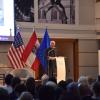
IIASA researchers are contributing to the Horizon Europe funded PARATUS project, which aims to promote disaster preparedness and resilience by co-developing stakeholder support tools for managing the systemic risk of compounding disasters.
The overarching aim of the PARATUS project is to increase the preparedness of first and second responders in the face of multi-hazard events and to reduce the risks related to impacts on various sectors that result from complex disasters.
As part of the project, researchers will develop a cloud-based online service platform that offers support in analyzing and evaluating dynamic risk scenarios and systemic risks caused by multi-hazard disasters. The project will perform in-depth assessments of the interactions between hazards and their resulting impacts in various sectors. In addition, it will analyze the current risk situation and study how alternative future scenarios could change multi-hazard impact chains. IIASA is leading the co-development of scenarios for future change with various stakeholders to develop four case study areas (including Alpine areas, the Caribbean, Istanbul, and Romania).
"By developing a robust, multi-sectoral risk assessment methodology that incorporates past events, Copernicus services, and future climate change scenarios, we are trying to enhance our understanding of multi-hazard risks and contribute to building resilience in our core sites. Through IIASA’s expertise in systems analysis we will ultimately be able to create comprehensive datasets that will empower us to make informed decisions for a safer future," explains IIASA Cooperation and Transformative Governance Research Group Leader, Nadejda Komendantova, who leads the project at IIASA.
The project team will adopt a participatory methodology and use a range of tools to develop decision support techniques. The methods developed in PARATUS will be co-designed together with local and regional communities and authorities. The case study areas cover combinations of multiple aspects: natural and anthropogenic hazard interactions (extreme weather events and associated incidents); scale of analysis (international, cross-border, to local applications); assets and vulnerability in different sectors (social science, human health, cultural heritage, environment and biodiversity, public financial management, and key economic sectors).
In addition, researchers working on the PARATUS project will address several key actions for a safer future.
First, the team will focus on determining the dynamic and interactive conditions of risk using data from satellite remote sensing and artificial intelligence to gain an in-depth understanding of risks that have arisen in the past and how they may evolve over time. Secondly, a multi-sectoral systemic risk assessment will be developed. This approach will allow to study how hazards and risks change in relation to climate change and other social factors.
Context-specific decision-making tools for risk reduction, including serious games and stress testing methodologies, will also be developed to assist in short- and long-term planning. The focus will be on the user, with the co-creation of a user-centered risk assessment and mitigation service to evaluate the impact chains of multi-hazard events with particular emphasis on cross-border and cascading impacts.
Finally, the project aims to extend external cooperation, impact, and transferability, in order to create a stakeholder hub that will bring together professionals from various cultural, geographic, and economic contexts.
The project has already received the Polish Smart Development Award in the “Project of the Future” category in July 2023. The prestigious Polish prize is awarded to innovative projects with great social impact, whose way of acting and thinking influence the intelligent and sustainable development of the life of society and the economy. Together with the Polish project partner organization, the Association of the Centre for System Solutions, PARATUS was recognized by the award organizers for its results to date as well as its potential to have a positive impact on socioeconomic development.
Adapted from a press release prepared by Deep Blue srl
Further information:
https://www.paratus-project.eu/
PROJECT PARTNERS
PARATUS brings together a consortium of 19 partners from 11 countries and includes representatives of research organizations, NGOs, small and medium enterprizes (SMEs), first and second responders, and local and regional authorities:
- University of Twente, Project Coordinator with wide experience in the application of spatial information in hazard, vulnerability and risk assessment
- University of Bucharest, Coordinator of the Romania Case Study
- Department of Emergency Situations, Ministry of Internal Affairs, main government organization responsible for the first response after disasters in Romania
- Istanbul Technical University, Coordinator of the Istanbul Case Study
- Istanbul Metropolitan Municipality, contributing to the Istanbul Case Study
- University of Vienna, Coordinator of the Alps Case Study
- Royal Netherlands Meteorological Institute, governmental organization developing a multi-hazard early warning center for the Caribbean
- The Netherlands Red Cross, specialized in risk assessment, impact-based forecasting, damage assessment and development of spatial databases for humanitarian purposes and contributing to the Caribbean Case Study
- The Resilience Advisors Network, leader of WP5 “External cooperation, Impact and Transferability”
- Technical University of Catalunya, leader of WP2 “Today’s future: how current hazard and risk may change”
- EURAC Research Centre, leader of WP1 “Learning from the past: understanding the dynamic and interactive conditions of risk”
- Centre for Systems Solutions, leading the co-development of serious games
- Red Cross Red Crescent Climate Centre, supports the humanitarian and development sectors to address long-term climate risk management and is leader of WP3 “Adapting to changes”
- FI Group, contributing to the impact, transferability, and exploitation of the project results
- Deep Blue, leader of Communication and Dissemination
- German Aerospace Centre, leading the exploitation of satellite remote sensing data and artificial intelligence
- International Institute for Applied Systems Analysis, leading the co-development of scenarios for future change
- Asian Institute of Technology, vast expertise in web-programming and contributing to the development of the web-based tool for dynamic risk assessment
- ASFiNAG Alpenstraßen GmbH, responsible for the operational management of motorways and expressways and contributing to the Alps Case Study
News

26 July 2024
Navigating new horizons to protect human and planetary health

14 June 2024
IIASA Leadership visits Washington DC

05 June 2024

